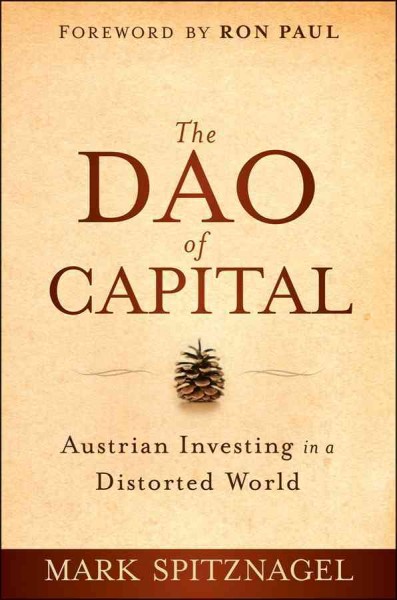 Have I said this before: this is a tough book to review.? Much as I am in sympathy with Austrian Economics, I am not in sympathy with Daoism.
Have I said this before: this is a tough book to review.? Much as I am in sympathy with Austrian Economics, I am not in sympathy with Daoism.
When I came to Christ at age 16, the major rival for my heart was Daoism, not the Catholicism that I grew up with.? My main difficulty was that Catholicism did not speak with a single voice on critical matters — one priest would say this, another that.
Daoism has an advantage in some ways because it seems to describe the world; the world is cyclical, and often a condition gives way to its opposite.
But Daoism, though descriptive of what happens, is amoral, as is much of radical libertarian thought.? A system without rules is no system.? There have to be rules for a good nation to exist.? On economics, there have to be ways to prosecute fraud.? There have to be ways to protect property rights.? That can’t happen without a strong, if limited, government.
Capitalism does not derive from Daoism, but from the laws of Moses, and the words of Jesus.? “Thou shalt not steal.” has impact, because it implies property rights.? 70% of the parables of Jesus involved money, and assumed that people were free to do with their resources as they saw fit.
Daoism did not develop capitalism.? It was a creation of the Christian West.? Was everything perfect in the way it was worked out?? No.? There were many mistakes, and much dispropriation of cultures that had no concept of private property.
Other Problems
The book would have been better without the constant repetition of foreign words.? It is pretentious to make readers learn a bevy of foreign words.
Minsky is better than the author makes him out to be.? At least Minsky sees how financing gets warped through the boom-bust cycle.
I believe that most financial crises occur because of government interference, but not all of them.? Men are greedy/envious/fearful enough to create self reinforcing cycles in the absence of government interference.? Look at the Creation more generally.? There are many species that ceased to exist long before Mankind became dominant.? In the same way, there have been many crises that have occurred in the absence of government interference.? “Man is born to trouble, as the sparks fly upward.”
Practical Upshot
In the last two chapters, he comes out in favor of the Q-ratio and the price-to-book style of value investing, plus quality.?? Both good ideas, but both require patience, which is in short supply among aging baby boomers.? The question to the reader is how long you are willing to wait.? That is the big question of much investing, and how to answer the question — the book says wait.? I agree, but it is tough to hold a lot in cash in a bull market.
Who would benefit from this book: It is a good book, though I doubt that many can follow the advice.? If you want to, you can buy it here: The Dao of Capital: Austrian Investing in a Distorted World.
Full disclosure: The publisher sent me the book after asking me if I wanted it.
If you enter Amazon through my site, and you buy anything, I get a small commission.? This is my main source of blog revenue.? I prefer this to a ?tip jar? because I want you to get something you want, rather than merely giving me a tip.? Book reviews take time, particularly with the reading, which most book reviewers don?t do in full, and I typically do. (When I don?t, I mention that I scanned the book.? Also, I never use the data that the PR flacks send out.)
Most people buying at Amazon do not enter via a referring website.? Thus Amazon builds an extra 1-3% into the prices to all buyers to compensate for the commissions given to the minority that come through referring sites.? Whether you buy at Amazon directly or enter via my site, your prices don?t change.

One thought on “Book Review: The Dao of Capital”